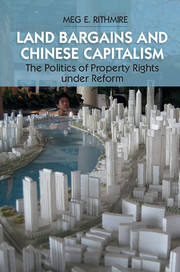Book contents
- Frontmatter
- Dedication
- Contents
- List of tables
- List of figures
- Acknowledgments
- List of Abbreviations
- Glossary
- 1 Property and Politics in China
- 2 The Making of the Real Estate Economy: Urban Reform and the Origins of the Party's Land Dilemma
- 3 The Political Economies of China
- 4 “Land as a State Asset”: Global Capital and Local State Power in Dalian
- 5 Property Rights and Distributive Politics: Urban Conflict and Change in Harbin, 1978 to the Present
- 6 Changchun Motor City: The Politics of Compromise in an Industrial Town
- 7 Conclusions
- Bibliography
- Index
7 - Conclusions
Published online by Cambridge University Press: 05 November 2015
- Frontmatter
- Dedication
- Contents
- List of tables
- List of figures
- Acknowledgments
- List of Abbreviations
- Glossary
- 1 Property and Politics in China
- 2 The Making of the Real Estate Economy: Urban Reform and the Origins of the Party's Land Dilemma
- 3 The Political Economies of China
- 4 “Land as a State Asset”: Global Capital and Local State Power in Dalian
- 5 Property Rights and Distributive Politics: Urban Conflict and Change in Harbin, 1978 to the Present
- 6 Changchun Motor City: The Politics of Compromise in an Industrial Town
- 7 Conclusions
- Bibliography
- Index
Summary
Some have suggested that the entire process of economic reform in China can be viewed as a reassignment of property rights. Property rights – over firms, firm assets, land, and so forth – have changed hands between central and local levels of the state, among different intrastate agencies, and between the state and various elements of the private sector. The speed and direction of this process have been dynamic, tortuous, and politically contingent rather than proceeding steadily from plan to market or toward private-property rights. Decisions about who controls land and property have been at the center of political contests for power and for recognition, in which a variety of players both inside and outside the Chinese state have staked claims. The chapters in this book have examined this “reassignment of property rights” at the national and subnational levels. Doing so has revealed a process of political bargaining over land control that contains theoretical lessons about the nature of property-rights change and empirical lessons about the role of land and property in Chinese capitalism. In this concluding chapter, I review the theoretical and empirical findings of the book, explore the argument about property rights as political bargains in comparative perspective, and finally turn to the present and future of land and capitalism in China.
The Politics of Property Rights
In the first chapter of this book, I outlined a theoretical approach that positions political choice and bargaining at the center of property-rights changes. Such changes, during the modern era, are rarely imposed on societies or economies by some exogenous forces; rather they emerge through political processes in which actors consciously seek to implement changes to property-rights arrangements. Whereas classical approaches envisage that changes in value – of land, labor, goods, and so forth – stimulate changes in the arrangements of control over property, this political approach sees value as endogenous to the political process. Property assumes greater or lesser value as the result of political decisions that assign value.
Political decisions that assign or change value and property rights are the products of political bargaining and moral argument, both of which occur under conditions of uncertainty. Social and economic actors bargain over property rights as they do over the distribution of any other power resource. However, actors do not adopt positions on property rights with exclusive attention to the expected distributional gains.
- Type
- Chapter
- Information
- Land Bargains and Chinese CapitalismThe Politics of Property Rights under Reform, pp. 171 - 192Publisher: Cambridge University PressPrint publication year: 2015



